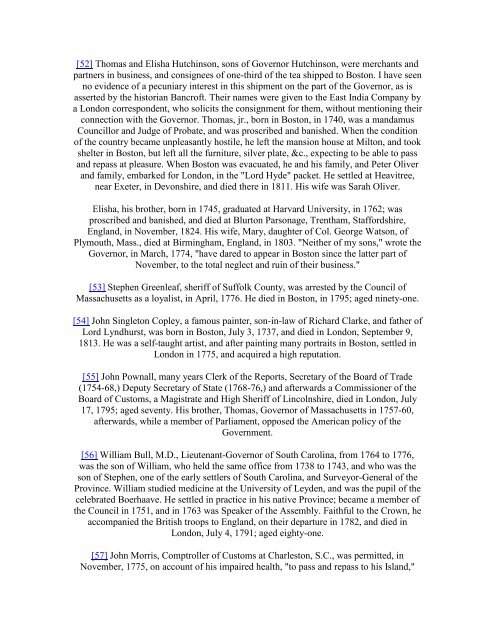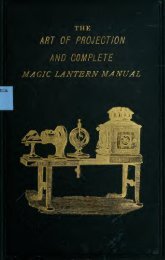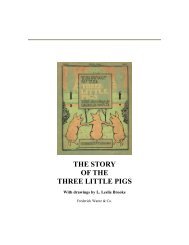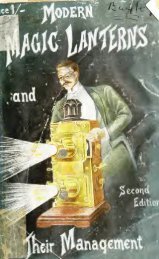TEA LEAVES: - Yesterday Image
TEA LEAVES: - Yesterday Image
TEA LEAVES: - Yesterday Image
Create successful ePaper yourself
Turn your PDF publications into a flip-book with our unique Google optimized e-Paper software.
[52] Thomas and Elisha Hutchinson, sons of Governor Hutchinson, were merchants and<br />
partners in business, and consignees of one-third of the tea shipped to Boston. I have seen<br />
no evidence of a pecuniary interest in this shipment on the part of the Governor, as is<br />
asserted by the historian Bancroft. Their names were given to the East India Company by<br />
a London correspondent, who solicits the consignment for them, without mentioning their<br />
connection with the Governor. Thomas, jr., born in Boston, in 1740, was a mandamus<br />
Councillor and Judge of Probate, and was proscribed and banished. When the condition<br />
of the country became unpleasantly hostile, he left the mansion house at Milton, and took<br />
shelter in Boston, but left all the furniture, silver plate, &c., expecting to be able to pass<br />
and repass at pleasure. When Boston was evacuated, he and his family, and Peter Oliver<br />
and family, embarked for London, in the "Lord Hyde" packet. He settled at Heavitree,<br />
near Exeter, in Devonshire, and died there in 1811. His wife was Sarah Oliver.<br />
Elisha, his brother, born in 1745, graduated at Harvard University, in 1762; was<br />
proscribed and banished, and died at Blurton Parsonage, Trentham, Staffordshire,<br />
England, in November, 1824. His wife, Mary, daughter of Col. George Watson, of<br />
Plymouth, Mass., died at Birmingham, England, in 1803. "Neither of my sons," wrote the<br />
Governor, in March, 1774, "have dared to appear in Boston since the latter part of<br />
November, to the total neglect and ruin of their business."<br />
[53] Stephen Greenleaf, sheriff of Suffolk County, was arrested by the Council of<br />
Massachusetts as a loyalist, in April, 1776. He died in Boston, in 1795; aged ninety-one.<br />
[54] John Singleton Copley, a famous painter, son-in-law of Richard Clarke, and father of<br />
Lord Lyndhurst, was born in Boston, July 3, 1737, and died in London, September 9,<br />
1813. He was a self-taught artist, and after painting many portraits in Boston, settled in<br />
London in 1775, and acquired a high reputation.<br />
[55] John Pownall, many years Clerk of the Reports, Secretary of the Board of Trade<br />
(1754-68,) Deputy Secretary of State (1768-76,) and afterwards a Commissioner of the<br />
Board of Customs, a Magistrate and High Sheriff of Lincolnshire, died in London, July<br />
17, 1795; aged seventy. His brother, Thomas, Governor of Massachusetts in 1757-60,<br />
afterwards, while a member of Parliament, opposed the American policy of the<br />
Government.<br />
[56] William Bull, M.D., Lieutenant-Governor of South Carolina, from 1764 to 1776,<br />
was the son of William, who held the same office from 1738 to 1743, and who was the<br />
son of Stephen, one of the early settlers of South Carolina, and Surveyor-General of the<br />
Province. William studied medicine at the University of Leyden, and was the pupil of the<br />
celebrated Boerhaave. He settled in practice in his native Province; became a member of<br />
the Council in 1751, and in 1763 was Speaker of the Assembly. Faithful to the Crown, he<br />
accompanied the British troops to England, on their departure in 1782, and died in<br />
London, July 4, 1791; aged eighty-one.<br />
[57] John Morris, Comptroller of Customs at Charleston, S.C., was permitted, in<br />
November, 1775, on account of his impaired health, "to pass and repass to his Island,"





